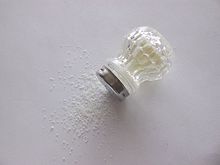Salt and cardiovascular disease
Chronic, high intake of dietary salt is associated with hypertension and cardiovascular disease, among other adverse health outcomes.
[9] A 2021 Cochrane review of people with chronic kidney disease, including those on dialysis, demonstrated robust evidence that salt reduction decreases systolic and diastolic blood pressure and albuminuria.
Both studies were designed and conducted by the National Heart, Lung, and Blood Institute in the United States, each involving a large, randomized sample.
[12] However, this study is especially significant because participants in both the control and DASH diet groups showed lowered blood pressure with decreased sodium alone.
[12] In 2018, the American Heart Association published an advisory stating that "if the U.S. population dropped its sodium intake to 1,500 mg/day, overall blood pressure could decrease by 25.6%, with an estimated $26.2 billion in health care savings.
"[13] There has been evidence from epidemiological studies, human and animal intervention experiments, supporting the links between high rate of salt intake and hypertension.
[4] In 2015, the United States Centers for Disease Control and Prevention began an initiative encouraging Americans to reduce their consumption of salty foods.
[21] The American Heart Association defined a daily sodium consumption limit of 1,500 milligrams (contained in less than 0.75 teaspoon of table salt).
[23] The US Centers for Disease Control and Prevention stated that the average daily sodium intake for Americans over 2 years of age is 3,436 milligrams.
[24] The majority of sodium consumed by North Americans is from processed and restaurant foods, while only a small portion is added during cooking or at the table.
Several studies have shown a relationship between sodium sensitivity and the increase in circulating fluid volume or peripheral vascular resistance.
[35] Possible mechanisms by which high dietary potassium intake reduces the risk of hypertension and cardiovascular disease have been proposed but remain insufficiently studied.
[36] However, studies have found a strong inverse association between long-term adequate to high rates of potassium intake and the development of cardiovascular diseases.
[36] The growing awareness of excessive sodium consumption in connection with hypertension and cardiovascular disease has increased the usage of salt substitutes at both a consumer and industrial level.
